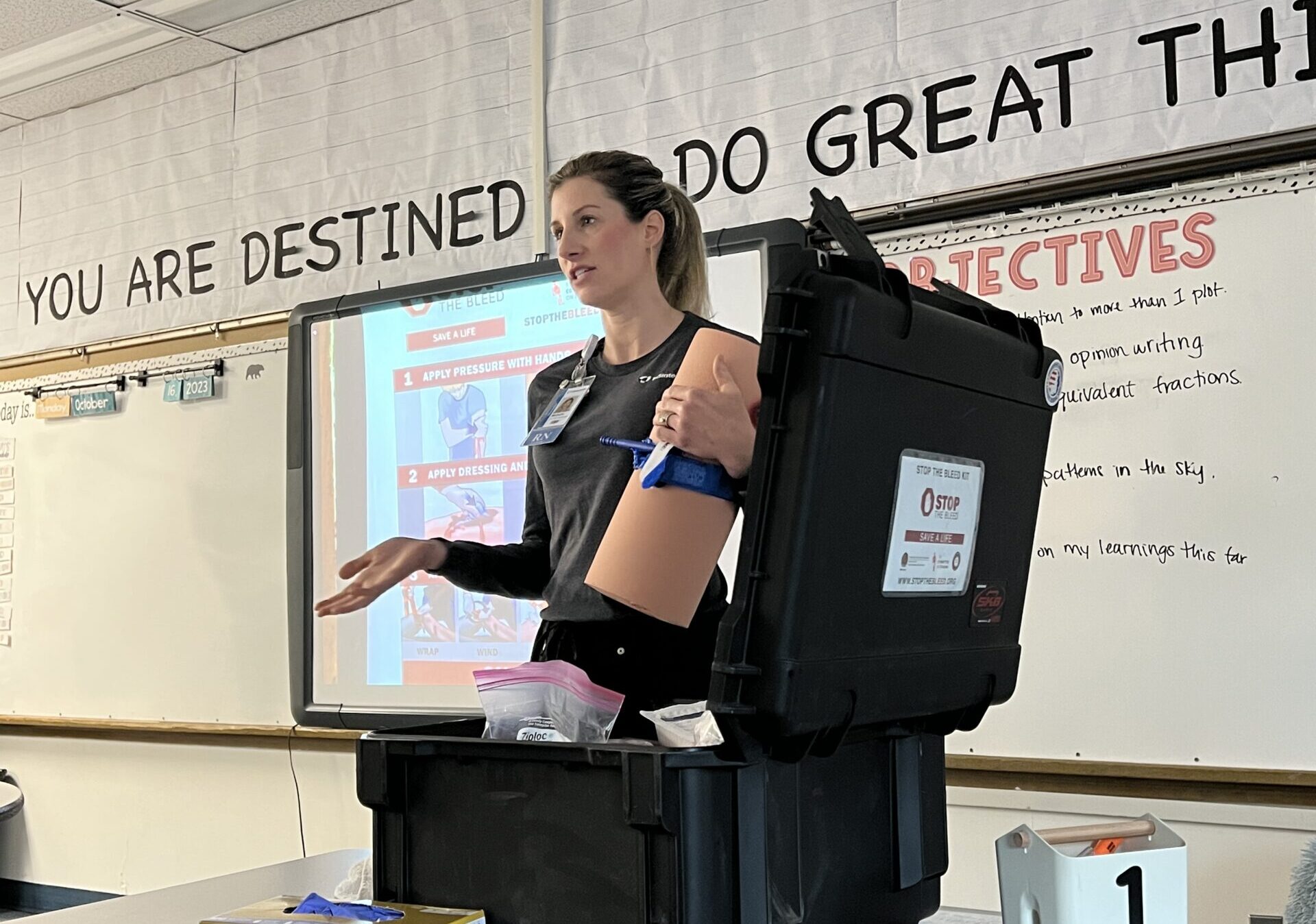Latest Stories

Trauma Prevention Program Stop the Bleed Kits in the Asotin & Clarkston School Districts
Share
Dedicated staff in the Emergency department lead TriState Health’s Trauma Injury Prevention Program (TIPP). Each year, the TIPP team focuses on community education to help reduce trauma related injuries that can cause disability or death. The program provides information on ways to reduce injuries and assists individuals and families who are experiencing financial hardship, giving them the tools they need to lower their risk of injuries.
The Trauma Injury Prevention Program is currently facilitating a Stop the Bleed School Project throughout Asotin County. Stop the Bleed’s primary purpose is to educate, empower, and equip bystanders to act during a bleeding emergency prior to the arrival of first responders. A person suffering life threatening blood loss can bleed to death within five minutes. Every second counts!
In a partnership with local EMS agencies, TriState Health is providing Stop the Bleed trainings and kits to area schools to assist with keeping our community safe and saving lives. A TIPP team member attended staff meetings at each school to provide teachers and administrators with the knowledge and subject matter expertise to train other school staff, volunteers, students, and parents on how to treat bleeding emergencies before first responders arrive on scene.
“The commitment to safety, collaboration with emergency responders, and flexibility
in scheduling allowed us to provide training across all campus locations. The training was delivered in two sessions at each school,” said Donna Franklin, Director of Health Services, Clarkston School District. “Participants were able to ask their questions of knowledgeable providers with firsthand experience in addressing traumatic bleeding.”
Trainees learn how to apply a tourniquet, pack a wound, and effectively apply pressure to stop bleeding. Upon training, each trainee is provided with a Stop the Bleed Kit for use in life threatening bleeding situations.
“It has been an honor to facilitate and train individuals within both the Clarkston and Asotin School Districts. Equipping our educators with the knowledge and skills for stopping life threatening bleeding has been very well received and rewarding,” expressed Michelle Schmidt, RN, TriState’s Trauma, Cardiac, & Stroke Program Manager. “Although we hope that these skills never need to be used, we are thankful for the partnership and eagerness within the districts to be prepared for the unthinkable. These Stop The Bleed actions can, and will, save a life.”
Stop the Bleed is a grassroots awareness campaign initiated by the U.S. Department of Homeland Security, originally created for school shootings. Uncontrolled bleeding is the leading cause of preventable death from trauma and the TIPP wants our community to be equipped if an emergency completion of the were to occur. Stop the Bleed kits and training can be used to treat bleeding injuries resulting from car and sport/gym accidents, as well as general accidents that can occur in the school or home setting. Each Stop the Bleed kit cost an average of $75 and has a shelf life of approximately five years.
“We truly appreciate the opportunity to partner with TriState Health, the Trauma
Injury Prevention Program, and Community First Responders to teach staff to recognize life-threatening bleeding and intervene effectively,” mentioned Thaynan Knowlton, Clarkston School District Superintendent. “Thank you for offering another strategy to keep our schools safe. We are grateful for the opportunity to join the efforts of others in the community to create a safer environment for everyone.”
Thanks to funds from the TriState Health Foundation with the support from Michael and Brooke Henze with a matching gift from Abbvie, Clarkston Walmart Community Grant, and the Washington State East Region EMS and Trauma Care Council, over 270 Stop the Bleed kits have been distributed to 12 schools with a combined 3,000+ students in Clarkston and Asotin School Districts.
In recent years, TriState Health’s Trauma Injury Prevention Program has facilitated various projects with community partners to fund other life-saving tools. These have included providing education on safe swimming and bicycling practices, along with life jackets, helmets, car seats, and headlamps for children.
To learn more on ways you can help, visit TSH.org/Foundation.